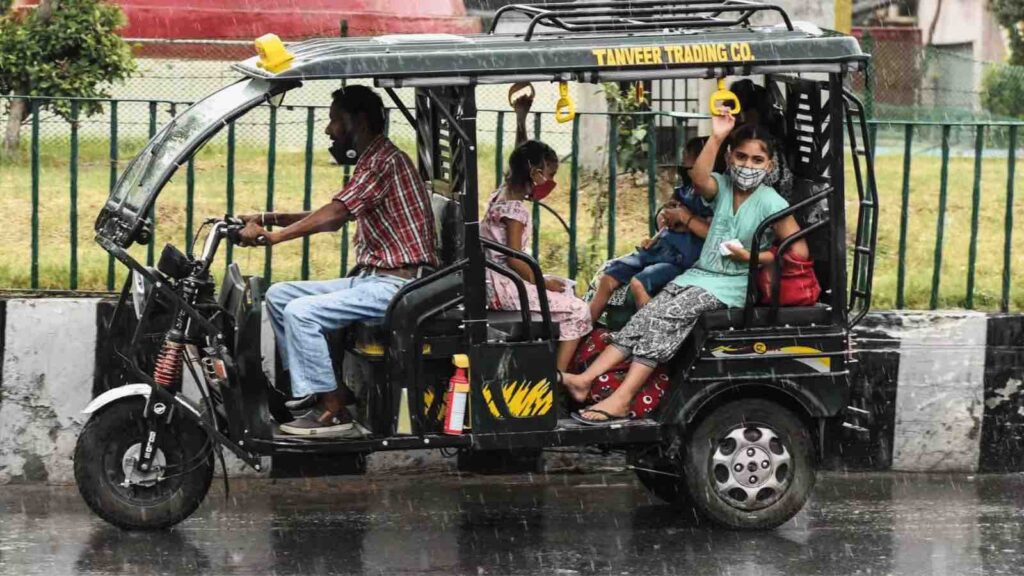Electric rickshaws play a pivotal role in India’s environmental strategy, emerging as key elements in combating pollution and steering the country towards cleaner, greener transportation option.
In the bustling lanes of New Delhi, Rithvik Kapoor, a former cycle rickshaw puller, now gracefully navigates his electric rickshaw. This 48-year-old’s shift to an eco-friendly vehicle is a microcosm of India’s significant pivot towards electric mobility.
As India’s economic might grows, the nation is witnessing a seismic shift towards sustainable transportation. Electric vehicles (EVs), particularly e-rickshaws, are at the forefront of this change, offering a robust solution to pollution and reducing dependence on fossil fuels. In urban and suburban areas, e-rickshaws are transforming first and last-mile connectivity, significantly reducing air pollution and noise.
RELEVANT SUSTAINABLE GOALS



E-Rickshaws: Driving Sustainable Change
Market trends reflect the growing dominance of e-rickshaws in India’s EV market, commanding an impressive 83% share. With a market value of USD 1.1 billion in 2021 and a projected surge to USD 2.8 billion by 2027, e-rickshaws are marking an era of exceptional growth. This trend is particularly notable as India seeks sustainable solutions amidst economic slowdowns and the impacts of the pandemic.
According to Vahan’s data, Uttar Pradesh leads in e-rickshaw registrations (4,03,411), followed by Delhi (1,17,885) and Bihar (1,08,669). Delhi’s high e-rickshaw density per million population underscores their prominence in the capital. The regional variance in adoption highlights the necessity for a uniform national strategy and infrastructure development.
Despite challenges like high upfront costs, investment uncertainties, and regulatory hurdles, e-rickshaws are gaining traction. They are bridging critical transportation gaps and offering eco-friendly alternatives. With approximately 1.5 million e-rickshaws in operation and sales on the rise, they are increasingly seen as a solution for improving mobility and supporting livelihoods. E-rickshaws are empowering marginalized communities, providing steady income sources, and contributing to household finances. They also offer cleaner, quieter travel options, addressing pollution and enhancing commuter safety.
Unleashing opportunities: Electric – Rickshaws as a vehicle for empowerment
E-rickshaws are more than just a transportation solution; they are a means of empowering women. Recognizing the gender-specific needs in travel and infrastructure is crucial for developing fair policies and effective mobility solutions. E-rickshaws provide women with safer transportation choices, encouraging their participation in economic activities. By enhancing first and last-mile connectivity, e-rickshaws reduce safety concerns for women commuters.
Investing in e-mobility should prioritize social inclusion and equitable transitions, especially in post-pandemic recovery efforts. The evolving EV sector offers employment opportunities that demand tailored skilling programs for women and disadvantaged groups. Understanding the experiences of e-rickshaw drivers and their families is vital for promoting holistic and sustainable economic growth. Ground-level insights should inform policies that support drivers and align with the broader vision of a greener economy.
Beyond passenger transportation, e-rickshaws are making significant inroads into goods transportation. These electric vehicles, particularly e-rickshaw loaders with their ample cargo spaces, offer an efficient and environmentally friendly option for intra-city deliveries and last-mile logistics. Despite facing hurdles such as limited charging infrastructure and higher initial costs, the significant advantages they offer in reducing emissions and operational expenses highlight the need for ongoing investment and awareness initiatives
E-rickshaws hold immense potential to foster inclusive and sustainable economic development in India. They address mobility issues, reduce pollution, and improve the lives of drivers. However, their full integration requires overcoming challenges related to regulations, infrastructure, and safety concerns. Gender-inclusive policies and strategies must be integral to the development of future mobility solutions.
Embracing e-mobility’s potential can lead India towards a more environmentally friendly and prosperous future. The rise of electric rickshaws not only revolutionizes the country’s transportation landscape but also empowers its citizens, guiding India towards a future where inclusivity and sustainability reign supreme.”
You may also be interested in :
10,000 Electric Buses Greenly For 169 Indian Cities In Ambitious ‘PM-EBus Sewa’ Scheme


